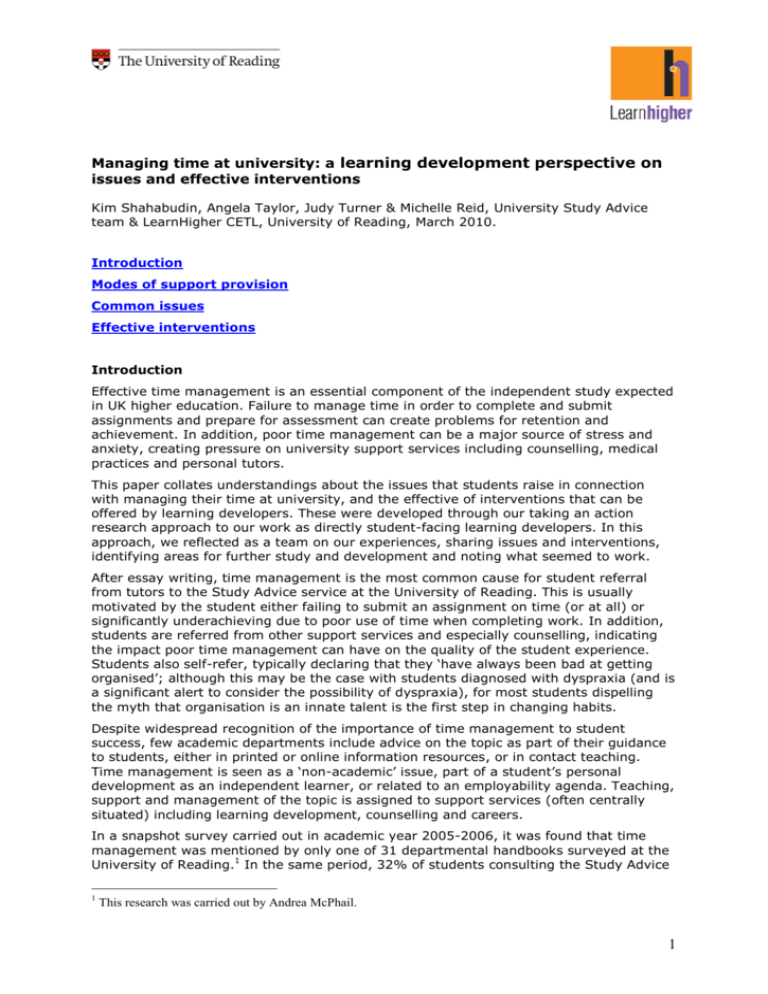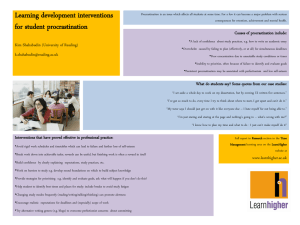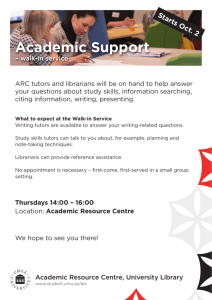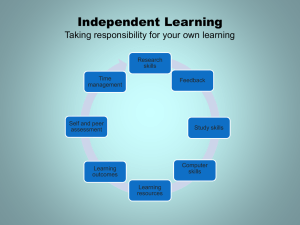Managing time at university: a learning
advertisement

Managing time at university: a learning development perspective on issues and effective interventions Kim Shahabudin, Angela Taylor, Judy Turner & Michelle Reid, University Study Advice team & LearnHigher CETL, University of Reading, March 2010. Introduction Modes of support provision Common issues Effective interventions Introduction Effective time management is an essential component of the independent study expected in UK higher education. Failure to manage time in order to complete and submit assignments and prepare for assessment can create problems for retention and achievement. In addition, poor time management can be a major source of stress and anxiety, creating pressure on university support services including counselling, medical practices and personal tutors. This paper collates understandings about the issues that students raise in connection with managing their time at university, and the effective of interventions that can be offered by learning developers. These were developed through our taking an action research approach to our work as directly student-facing learning developers. In this approach, we reflected as a team on our experiences, sharing issues and interventions, identifying areas for further study and development and noting what seemed to work. After essay writing, time management is the most common cause for student referral from tutors to the Study Advice service at the University of Reading. This is usually motivated by the student either failing to submit an assignment on time (or at all) or significantly underachieving due to poor use of time when completing work. In addition, students are referred from other support services and especially counselling, indicating the impact poor time management can have on the quality of the student experience. Students also self-refer, typically declaring that they ‘have always been bad at getting organised’; although this may be the case with students diagnosed with dyspraxia (and is a significant alert to consider the possibility of dyspraxia), for most students dispelling the myth that organisation is an innate talent is the first step in changing habits. Despite widespread recognition of the importance of time management to student success, few academic departments include advice on the topic as part of their guidance to students, either in printed or online information resources, or in contact teaching. Time management is seen as a ‘non-academic’ issue, part of a student’s personal development as an independent learner, or related to an employability agenda. Teaching, support and management of the topic is assigned to support services (often centrally situated) including learning development, counselling and careers. In a snapshot survey carried out in academic year 2005-2006, it was found that time management was mentioned by only one of 31 departmental handbooks surveyed at the University of Reading.1 In the same period, 32% of students consulting the Study Advice 1 This research was carried out by Andrea McPhail. 1 service at the university cited time management as their main study concern, and 41% of all students consulting Study Advice received advice on time management. Further evidence of the demand for time management advice for students beyond Reading has emerged since, with the Time Management webpages consistently among the most accessed on the LearnHigher website, and highly Google-ranked (in the top 5 results for time management student/university), suggesting that they are also linked to by many other websites. Anecdotally, learning developers and academic tutors report an increasing lack of familiarity with independent study in students entering higher education. To achieve student success, it is vital that appropriate practices to develop our students as independent learners are quickly developed. As a result, research into common issues and effective interventions for time management problems is especially timely. back to top Modes of support provision Generic workshops, self-help guides and one-to-one advice sessions offered by departmental or centrally located learning developers are the usual modes of support provision. Where academic departments offer standalone study skills courses, time management is sometimes included. Embedded activities within subject teaching (such as reflecting on use of time to complete an assignment) can be extremely useful, but are less frequently seen. One-to-one advice sessions offer the opportunity to make the fullest assessment of student needs and the causes of difficulties, and to deliver the most effective targeted interventions. We find that students who present requesting advice on time management often need to develop other areas of their study practices in order to manage their time successfully. If a student does not practise selective and active reading, for instance, unmediated advice on how to fit their study tasks into the available time is likely to meet with the response that the two do not fit, which is why they have a problem in the first place! However, one-to-one advice is labour-intensive, and in an economic climate where increasing need for provision must be balanced against scarcity of resources, it is likely that a mix of modes of support will be the pragmatic solution. Workshops on time management are a labour-effective way of reaching larger numbers of students with minimal contact time. The most comprehensive will offer an overview of issues and strategies, and engage students with practical activities and exercises, providing handouts and web links for students to follow for more detailed advice. Alternatively they can focus on single aspects of the topic (e.g. planning and organisation, using time efficiently, avoiding distractions and staying motivated) or on time management in particular situations (e.g. for dissertations or revision, or during an exam). Workshops can be time-consuming for tutors to develop, especially if they include supporting resources. However in the LearnHigher CETL, we have developed sets of fully resourced workshops (including handouts, teaching guides, links to supporting materials and presentation slides) which are informed by our research and peer-evaluated, and can be delivered by learning developers, academic subject tutors or sessional tutors using examples suitable to particular disciplines or institutions. (More details at http://www.learnhigher.ac.uk/videoresources/.) Self-help guides are provided by most learning development services in paper and online formats. Like workshops, they can range in the depth of information provided from quick tips and overviews to more detailed advice on specific aspects or situations. Although online provision of support resources is increasingly standard, this may not always be either the preferred, or the best format. In research conducted at the University of 2 Reading in 2006-07 with first year students, the same advice was offered in three different formats: as a paper leaflet; as an online guide; as an oral presentation. Students were asked a term later which of the three formats they preferred, which they had used most often, and which they felt had helped them to understand and remember the information best. They reported that they liked the easy accessibility of the online version, but had referred to the paper leaflet most often and felt that this format had best helped them to understand the information. As a consequence we now provide all online advice in printable versions for students to download and print off if they prefer. Other self-help tools for time management can include diaries and wallcharts, as well as the provision of more casual resources including Word documents with grids for planning workloads, projects and weekly study schedules. As part of our research for LearnHigher (and in conjunction with the University of Brighton and designers at Chalet Alpin), we have developed a folding year planner which combines the portability of a diary with the capacity to provide an overview offered by wall planners. These are designed to be highly adaptable in their use, and incorporate timely study tips. They have proved popular with students at the University of Reading and at other institutions which have adopted them. (More details at http://learnhigher.ac.uk/home/year_planner.html.) back to top Common issues Although it is common for students to seek support with their time management when they are feeling overwhelmed, for most this is a short term state, induced by a particular set of circumstances. Often the cause of this overwhelm can be found in the greater expectation of self-management of studies found in UK higher education. Students transiting to UK higher education from educational cultures where use of time is more directed (for instance, UK secondary education, most overseas academic cultures, some types of employment) are surprised by the extent to which they are expected to organise their own use of study time in order to meet deadlines and keep on top of regular study commitments. Modularisation of courses and a growing student demographic has exacerbated these difficulties, with module providers rarely able to co-ordinate staged deadlines for assignments in different modules. Consequently it is common (especially in Humanities and Social Science subjects) to find students with long unstructured periods in the year during which they do very little independent study, followed by a frantic period working on several summative assignments, all due for submission on the same day. This pattern can result in under-achieved work and late or non-submission. Other students find themselves genuinely over-committed. University offers more in terms of experiences than just study; on campus alone, students may be involved in clubs and societies, student media and union activities, and extra-curricular activities within their departments. The recent economic climate has made students more aware of the need for ‘added value’ in the post-degree job market and, as a result, more are undertaking voluntary and part-time paid work or placements. Some students have caring or financial commitments which must be balanced with study time, or are involved in off-campus activities. Failure to develop effective study practices in areas such as academic writing, reading, research or note-making can also impact negatively on time management. Much time can be wasted in over-reading, re-writing or re-reading notes, or an inability to structure written work. A lack of academic confidence is often at the root of such difficulties, sometimes made worse by the low marks awarded to poorly completed work. There has been much observation of the reduced capacity of recent student cohorts for focused periods of concentration on academic study. The short attention span of the ‘MTV 3 Generation’ is in direct conflict with traditional expectations of learning practices in higher education which require focused attention to understand complex reading and research practices. Distraction from study is especially common because both academic work and leisure activities are accomplished through the same technological devices (i.e. computers, PDAs). Students seek support with avoiding distractions and maintaining their motivation, especially when completing lengthy projects like dissertations and major research projects. Some students may present with more serious barriers to time management. These include habitual and persistent procrastination, perfectionism and videogame addiction. This kind of difficulty requires a more co-ordinated approach, with learning developers working in tandem with other support providers who may include counsellors, medical services, Hall wardens or personal and academic tutors. back to top Effective interventions With students who are feeling overwhelmed, a productive start can be made by getting them to list all their current tasks. Often students avoid confronting the scale of the work they need to complete, and a perfectly achievable list begins to feel unachievable because it is not properly known. Putting it on paper starts to get things back under control and re-establishes a sense of proportion. If the list is achievable, tasks can be broken down into less daunting chunks, and a work schedule planned: if it is unachievable, it can be prioritised and decisions made about which tasks will remain undone. If students are feeling extremely anxious, it can be helpful to identify with them one task that they can do immediately to break the circle of inaction. Difficulties in prioritising can arise if the student is lacking in confidence, or new to university. Students can feel under pressure from some tutors who insist that the tasks they have set are essential for success in the course. Students accustomed to being more directed in their previous education experience will have particular difficulties if they are getting similar messages from more than one tutor – how should they decide which to do first? Listing their tasks and putting them in columns (now, soon and later) is helpful, but how can you help them to develop criteria for those decisions? One strategy is to ask students to set their tasks in the context of the goals they are helping them to achieve. Once they have established what their goals are (e.g. get a good degree, understand this topic, gain information to write my essay), they need to ask, how does this task help you to reach them? And what will happen if you don’t do it now – or at all? Deadlines and word counts can be used as tools to help students use time appropriately when writing assignments. Suggesting that students set their own early or staged deadlines for completion is now standard advice. However, few students set deadlines to start tasks. Completion deadlines can be daunting as they imply a set time when work will be perfect – start deadlines take some of that pressure away, implying rather ‘time when I have to move on’, and are motivating because they provide something new to look forward to. Suggesting that students work out a rough division of their word count for each section of their work and work to that can help them to understand the scope of the work they are being asked to achieve. It also maintains their focus, discourages waffle and over-writing (with concomitant editing time needed to be added), and can be a useful tool in breaking procrastination cycles by offering small achievable targets. Working on developing study practices to achieve the most effective use of available time is clearly a productive and desirable aim, but learning developers seldom have the resources to spend lengthy periods of dedicated development time with individual students. Ideally students would see the benefit of developing more effective practices 4 and take this on for themselves – but if they are already feeling over-burdened with tasks, they are unlikely to volunteer to take on what they may see as ‘added extras’ which are not obviously relevant to solving their immediate concerns. Making the relevance of such practices clearer can be motivating. There are many areas of study where students can save time with more efficient practices: reading and note-making are two very significant ones. Getting the student to reflect on their use of time when studying often reveals which practices they are spending too much time on: using the development of one crucial practice as a model to show how much time can be saved can motivate the student to seek out self-help resources for other practices. Distraction and inability to focus on study has a major impact on managing time. Interventions work best when they centre on the student building awareness of their triggers for distraction, and planning ahead to avoid them. Often simply asking them to reflect on which is their best time of day for focusing, and whether they use that time effectively can be enough to solve the problem. In particular, students need to recognise that they must establish habits that stop them from wasting their best time for concentration (for instance, choosing a task the night before to undertake first in the morning). In turn, we need to work with the shorter attention spans displayed by students, by suggesting that they change study modes frequently (for instance, read a page, then write notes), and that they break their larger tasks down into achievable chunks. More serious problems like ingrained procrastination, perfectionism and addiction may need a co-ordinated approach to support. However there are interventions that have proved more or less effective even here. It is important to avoid rigid timetables or complex organisational schemes, for instance, as these rarely work, and create more feelings of failure when something goes wrong. Well-established procrastination often stems from a fear that submitted work will not be good enough, and that the student will be revealed as a failure. Breaking tasks down to small enough units that they can be completed during an advice session, then working intensively with the student to revise that unit and show them how the work meets marking criteria can build academic confidence. Establishing the practice of writing drafts to get ideas down, then revising once is better than the common perfectionist habit of constant minute revision that prevents moving on to the next section. It may help to suggest that they set up a private blog, and write a section a day on this: the change to another format can free up the student from the fear of failure in terms of academic writing. If a subject academic can be recruited to comment on a formative piece in terms of ‘is this good enough?’, this will also build confidence. Another common cause of procrastination is the subconscious belief that studying is a luxury or reward that has to be earned. The tasks undertaken to justify time spent on studying often (ironically) make that time less productive when it is reached, because it is pushed into the most difficult time of day for concentration: the failure to study then brings on more self-punishment. Students in this cycle (often mature students) need to consider what they have done to reach university and ask themselves if this is not enough to answer the question – do you not deserve it? back to top 5







